Serving 1,211 students in grades Prekindergarten-12, Somerset Academy Collegiate ranks in the bottom 50% of all schools in Texas for overall test scores (math proficiency is bottom 50%, and reading proficiency is bottom 50%).
The percentage of students achieving proficiency in math is 19% (which is lower than the Texas state average of 41%). The percentage of students achieving proficiency in reading/language arts is 47% (which is lower than the Texas state average of 51%).
The student:teacher ratio of 21:1 is higher than the Texas state level of 14:1.
Minority enrollment is 92% of the student body (majority Hispanic), which is higher than the Texas state average of 75% (majority Hispanic).
Quick Stats (2025)
- School Type: Charter School
- Grades: Prekindergarten-12
- Enrollment: 1,211 students
- Student:Teacher Ratio: 21:1
- Minority Enrollment: 92%
- Graduation Rate: ≥90% (Top 50% in TX)
- Overall Testing Rank: Bottom 50%
- Math Proficiency: 19% (Btm 50%)
- Reading Proficiency: 47% (Btm 50%)
- Science Proficiency: 28% (Btm 50%)
- Source: National Center for Education Statistics (NCES), TX Dept. of Education
School Overview
Somerset Academy Collegiate's student population of 1,211 students has declined by 7% over five school years.
The teacher population of 58 teachers has declined by 18% over five school years.
School Type
Grades Offered
Grades Prekindergarten-12
Total Students
1,211 students
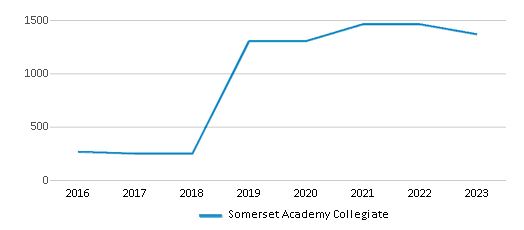
Gender %
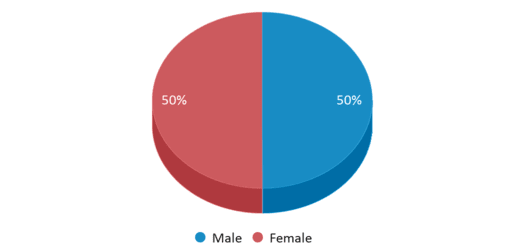
Total Classroom Teachers
58 teachers
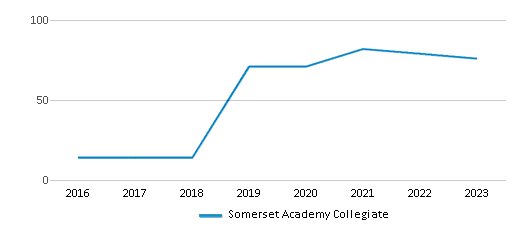
Students by Grade
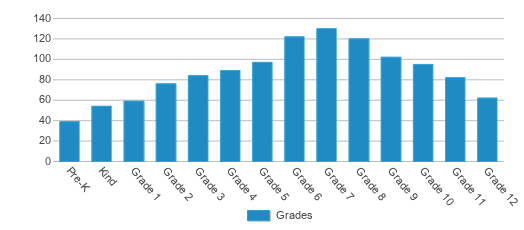
School Rankings
Somerset Academy Collegiate ranks within the bottom 50% of all 8,188 schools in Texas (based off of combined math and reading proficiency testing data).
The diversity score of Somerset Academy Collegiate is 0.32, which is less than the diversity score at state average of 0.64. The school's diversity has stayed relatively flat over five school years.
Overall Testing Rank
#6205 out of 8188 schools
(Bottom 50%)
(Bottom 50%)
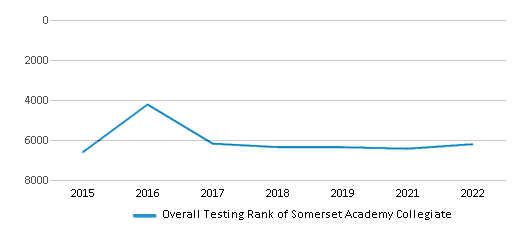
Math Test Scores (% Proficient)
19%
41%
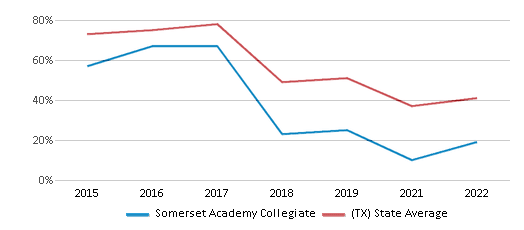
Reading/Language Arts Test Scores (% Proficient)
47%
51%
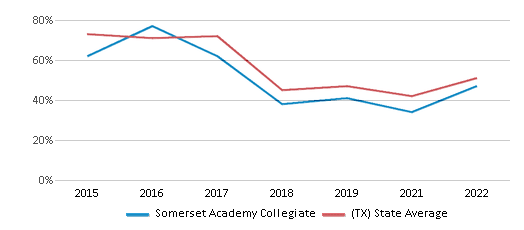
Science Test Scores (% Proficient)
28%
46%
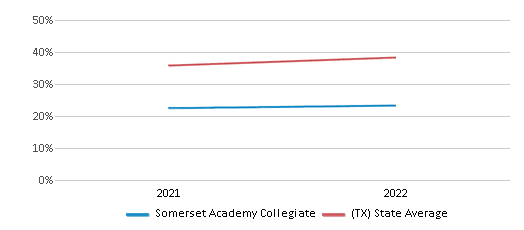
Student : Teacher Ratio
21:1
14:1
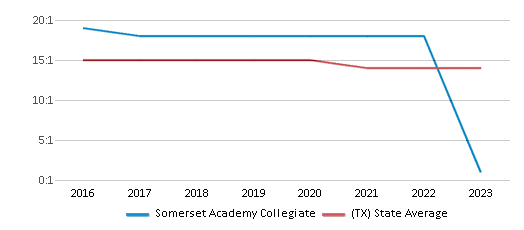
American Indian
n/a
n/a
Asian
1%
6%
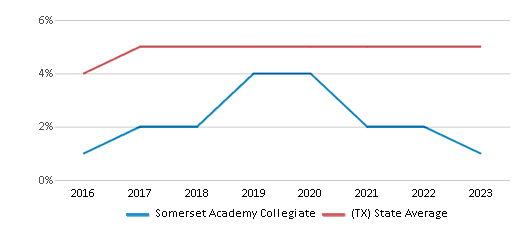
Hispanic
82%
53%
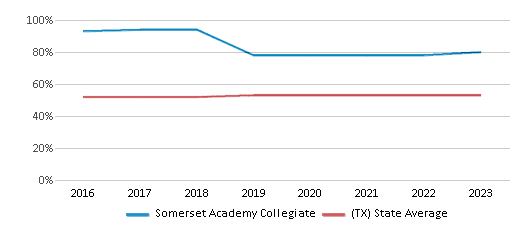
Black
7%
13%
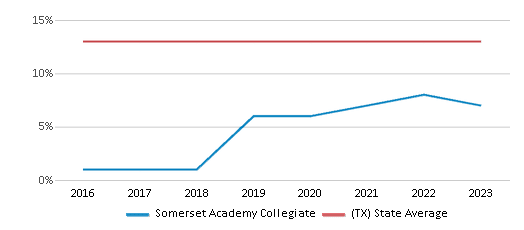
White
8%
25%
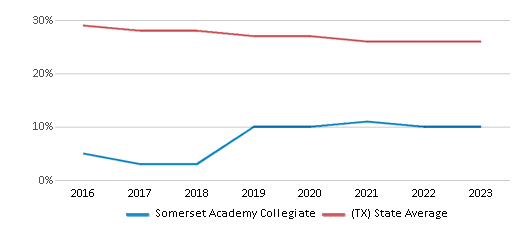
Hawaiian
n/a
n/a
Two or more races
2%
3%
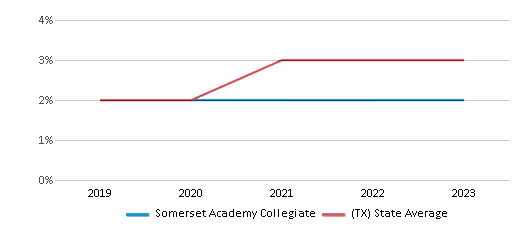
All Ethnic Groups
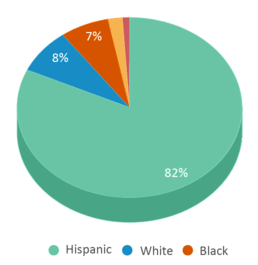
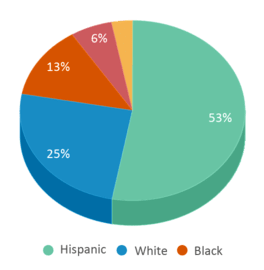
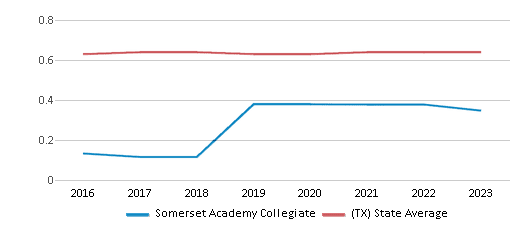
Graduation Rate
≥90%
90%
Participates in the National School Lunch Program (NSLP)
Yes
Eligible for Free Lunch
61%
57%
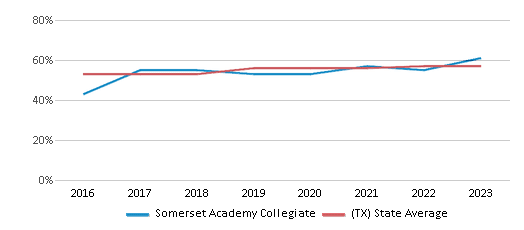
Eligible for Reduced Lunch
10%
5%
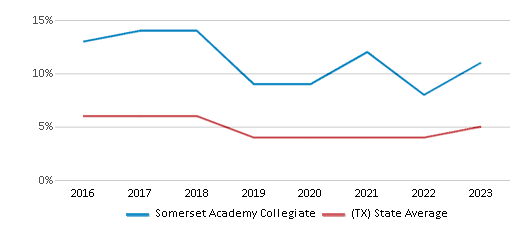
School Statewide Testing
School District Name
Source: National Center for Education Statistics (NCES), TX Dept. of Education
Profile last updated: 02/09/2025
Frequently Asked Questions
What is Somerset Academy Collegiate's ranking?
Somerset Academy Collegiate is ranked #6205 out of 8,188 schools, which ranks it among the bottom 50% of public schools in Texas.
What schools are Somerset Academy Collegiate often compared to?
Somerset Academy Collegiateis often viewed alongside schools like Sst Alamo, Kipp Esperanza Primary by visitors of our site.
What percent of students have achieved state testing proficiency in math and reading?
19% of students have achieved math proficiency (compared to the 41% TX state average), while 47% of students have achieved reading proficiency (compared to the 51% TX state average).
What is the graduation rate of Somerset Academy Collegiate?
The graduation rate of Somerset Academy Collegiate is 90%, which is equal to the Texas state average of 90%.
How many students attend Somerset Academy Collegiate?
1,211 students attend Somerset Academy Collegiate.
What is the racial composition of the student body?
82% of Somerset Academy Collegiate students are Hispanic, 8% of students are White, 7% of students are Black, 2% of students are Two or more races, and 1% of students are Asian.
What is the student:teacher ratio of Somerset Academy Collegiate?
Somerset Academy Collegiate has a student ration of 21:1, which is higher than the Texas state average of 14:1.
What grades does Somerset Academy Collegiate offer ?
Somerset Academy Collegiate offers enrollment in grades Prekindergarten-12
What school district is Somerset Academy Collegiate part of?
Somerset Academy Collegiate is part of Somerset Academies Of Texas School District.
School Reviews
5 5/18/2021
I absolutely love Brooks Collegiate Academy. I have a child in 5th and 8th grade, both have excelled in their studies. My daughter plays basketball and softball and has maintained straight A average the entire school year. The teachers are amazing and have worked very hard to keep virtual learners as well as in-school students on track. I am amazed at all the things the school has done for the seniors. Both of my kids were in Theater last year and the Theater coach is fantastic. My daughter passed her TSAI2 test for college credits on the first try to will be taking dual credit courses starting next year. Love this school.
1 5/6/2021
Makes promises and then breaks every promise. Not great in the special education services. Students are not services as promised. Very disappointing. I would not recommend this school if you have a child that need special education services.
Review Somerset Academy Collegiate. Reviews should be a few sentences in length. Please include any comments on:
- Quality of academic programs, teachers, and facilities
- Availability of music, art, sports and other extracurricular activities
Recent Articles

What Is A Charter School?
Explore the world of charter schools in this comprehensive guide. Learn about their history, how they operate, and the pros and cons of this educational innovation. Discover key facts about charter schools, including admission policies, demographics, and funding, as well as what to look for when considering a charter school for your child.

10 Reasons Why High School Sports Benefit Students
Discover the 10 compelling reasons why high school sports are beneficial for students. This comprehensive article explores how athletics enhance academic performance, foster personal growth, and develop crucial life skills. From improved fitness and time management to leadership development and community representation, learn why participating in high school sports can be a game-changer for students' overall success and well-being.

February 05, 2025
Understanding the U.S. Department of Education: Structure, Impact, and EvolutionWe explore how the Department of Education shapes American education, from its cabinet-level leadership to its impact on millions of students, written for general audiences seeking clarity on this vital institution.









